Boost your immune system with a variety of nutritious foods. Elderberry provides antioxidants and combats flu viruses, while button mushrooms are rich in selenium, riboflavin, and niacin, aiding white blood cells. Oysters deliver zinc to strengthen your immune response. Watermelon, packed with vitamin C and glutathione, maximizes immune-boosting benefits especially near the rind. Wheat germ offers essential vitamins and fiber, and sweet potatoes enhance immune response with antioxidants. Miso supplies probiotics for gut health. Ginger and broccoli's anti-inflammatory and antioxidant properties protect against infections. Incorporating these foods into your diet can enhance your body's natural defenses further.
Key Takeaways
- Elderberry provides antioxidants and fights inflammation, supporting immune system properties and blocking flu viruses.
- Button mushrooms contain selenium, riboflavin, and niacin, which activate white blood cells and enhance infection response.
- Oysters offer zinc, essential for activating white blood cells and fortifying the immune system.
- Spinach is loaded with vitamins A, C, and E, protecting the body from free radicals and supporting blood cell production.
- Garlic fights bacteria, lowers cholesterol, and combats infections, with raw garlic offering maximum immune benefits.
Elderberry
Incorporating elderberry into your diet can provide a potent dose of antioxidants that may help combat inflammation. Think of it as your secret weapon against those pesky flu viruses. While elderberry won't make you invincible, its immune support properties are nothing to sneeze at.
Studies suggest elderberry extract can block flu viruses, giving your body a fighting chance. But don't ditch your flu vaccinations just yet; they're still essential for thorough protection.
Elderberry's health benefits don't stop there—it's also a tasty addition to juice and smoothies. So, why not add a bit of elderberry magic to your diet? Your immune system will thank you, and you'll have an excuse to drink more smoothies. Win-win!
Button Mushrooms
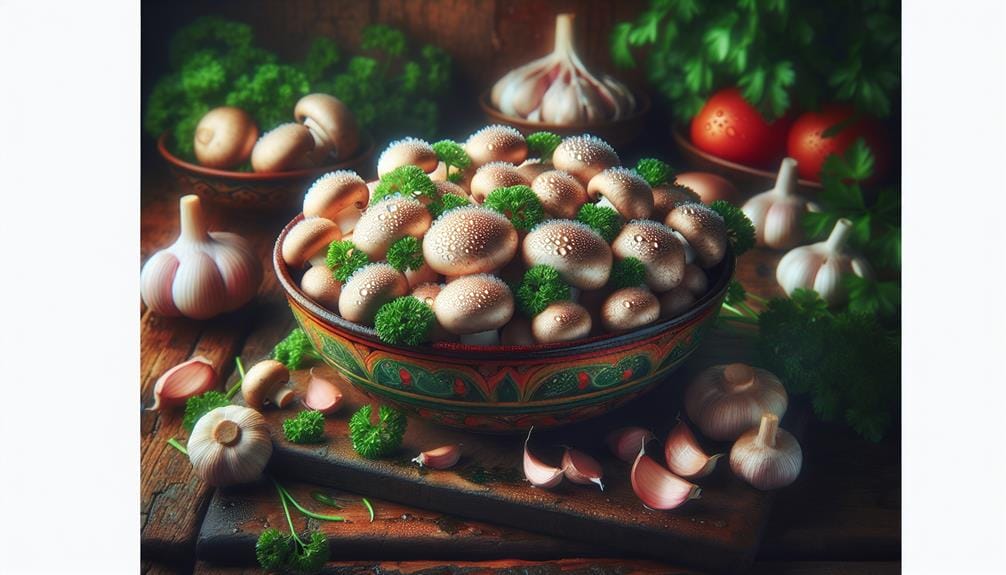
Button mushrooms pack a punch when it comes to bolstering your immune system with essential nutrients like selenium, riboflavin, and niacin. Think of these little fungi as tiny knights in shining armor, ready to defend your immune health.
Selenium helps activate white blood cells, preventing severe flu symptoms. Riboflavin and niacin boost your body's response to infections, making button mushrooms your immune function's best friend.
Oysters
Oysters offer a significant dose of zinc, essential for activating white blood cells and fortifying your immune system. Imagine eating something that not only tastes like the ocean but also helps you fight off infections. That's oysters! Their rich zinc content supports immune health by supercharging your immune system functions. When your immune system is in tip-top shape, you're better equipped to fend off those pesky germs.
Here's a quick table to highlight the benefits:
| Benefit | Description |
|---|---|
| Zinc-rich | Boosts white blood cell activity |
| Infection-fighting | Helps defend against illnesses |
| Immune health | Supports overall immune system functions |
| Essential nutrients | Provides crucial nutrients for immune support |
Watermelon

Watermelon is a powerhouse of antioxidants like glutathione, which can bolster your immune system and protect against infections.
Eating the juicy flesh close to the rind maximizes these immune-boosting benefits.
Besides being invigorating, watermelon is packed with Vitamin C, further supporting your immune health.
Rich in Antioxidants
Incorporating watermelon into your diet can greatly enhance your immune system due to its rich antioxidant content. This juicy delight, known for its immune-boosting properties, is packed with glutathione.
That's right, the red pulpy flesh near the rind isn't just for show—it's a powerhouse of antioxidants waiting to strengthen your defenses. By munching on watermelon, you're not just enjoying an invigorating snack; you're giving your immune system a leg up.
Plus, with its high water content, watermelon helps with hydration, which is essential for keeping your immune system in tip-top shape. So, next time you see that vibrant red fruit, grab a slice and let it work its magic from the inside out!
Hydration and Immunity
Staying hydrated with watermelon not only quenches your thirst but also bolsters your immune system. Think of it as nature's invigorating shield against germs.
The red pulpy flesh near the rind is loaded with immune-boosting benefits, thanks to its rich antioxidant content. We're talking about glutathione here, folks—an antioxidant superhero that strengthens your immune response and ramps up infection defense.
So, munching on watermelon isn't just a summertime treat; it's your ticket to a healthier you. Regularly enjoying this delicious fruit can help arm your body against infections. Plus, it's a revitalizing way to stay hydrated while giving your immune system a juicy, immune-boosting boost.
Watermelon: it's like drinking a superhero smoothie!
Vitamin C Source
Did you know that a cup of watermelon packs about 12.5 mg of vitamin C, covering roughly 21% of the daily recommended intake for women and 17% for men?
Watermelon isn't just invigorating; it's a fantastic way to boost your immune system. Vitamin C supports white blood cells, essential for fighting infections, and aids in collagen production for healthy skin. Plus, it's a revitalizing source of hydration.
While red bell peppers might steal the spotlight with their higher vitamin C content, watermelon holds its own.
- Boosts immune system
- Supports white blood cells
- Aids collagen production
- Helps with hydration
- Reduces cold duration
Wheat Germ
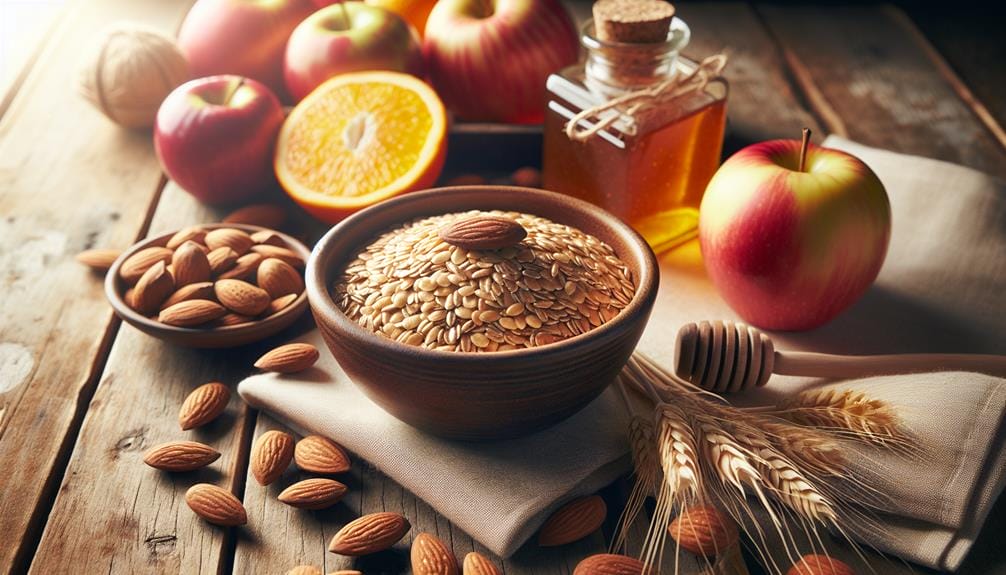
Wheat germ, a nutrient-rich component of the wheat seed, provides a powerhouse of essential vitamins, minerals, and antioxidants to support your immune system. Think of it as the superhero of grains, swooping in to boost your immune function with its rich nutritional content.
Packed with zinc, B vitamins, and fiber, wheat germ helps protect your body from damage and supports cell regeneration. You can easily sprinkle it into your favorite recipes, like smoothies, yogurt, or even pancakes, to enhance their nutritional punch.
Trust us, your immune system will thank you for adding this versatile ingredient to your diet. Who knew such a tiny part of a wheat seed could pack such a big punch?
Spinach
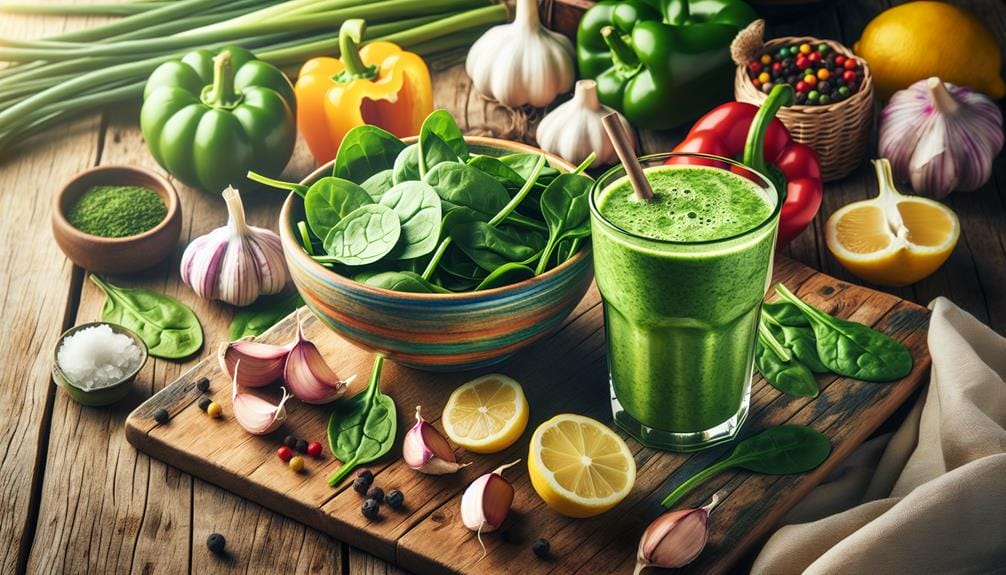
Spinach is a nutrient-dense superfood loaded with vitamins A, C, and E, essential for boosting your immune system.
Its antioxidant properties protect your body from free radicals, reducing potential cellular damage.
Plus, you can enjoy spinach raw or lightly cooked, making it a versatile addition to your meals.
Nutrient-Dense Superfood
Packed with vitamins A, C, and E, spinach is a nutrient-dense superfood that can greatly enhance your immune health. This leafy green isn't just Popeye's favorite—it's also loaded with antioxidants that help protect your cells from damage.
Plus, it's high in iron, which is essential for the production of red and white blood cells, keeping your overall health in tip-top shape.
Want to know why you should embrace spinach?
- Boosts immune health: Thanks to its rich vitamin content.
- Protects cells: Antioxidants to the rescue!
- Supports blood production: Iron to keep those red and white cells flowing.
- Versatile in meals: Salads, smoothies, or cooked dishes.
- Enhances overall health: Your body will thank you.
Antioxidant Powerhouse Qualities
Moving on, one of spinach's standout features is its impressive antioxidant profile, which plays a key role in protecting your cells from damage. This leafy green is packed with vitamins A, C, and E, essential for immune health. Spinach's antioxidants, like beta-carotene and lutein, help keep your cells in top shape. Plus, it's a great source of iron, crucial for red blood cell production and overall immune function. The fiber in spinach supports gut health, enhancing nutrient absorption and fighting infections. To maximize benefits, enjoy spinach raw or lightly cooked. Take a look at the table below for a quick summary:
| Nutrient | Benefit | How It Helps |
|---|---|---|
| Antioxidants | Cell protection | Reduces damage |
| Vitamins | Immune health | Boosts defense |
| Iron | Red blood cell production | Enhances immunity |
| Fiber | Gut health | Improves absorption |
| Beta-carotene | Antioxidant power | Fights free radicals |
Versatile Culinary Uses
You'll find that incorporating spinach into your meals is incredibly easy, thanks to its versatility in a wide range of dishes. This leafy green is a true superfood, packed with immune-boosting nutrients that support cell regeneration and DNA repair.
Whether you're a kitchen novice or a culinary wizard, spinach can seamlessly fit into your diet.
Try adding it to:
- Smoothies for a nutrient-dense kickstart to your day.
- Salads for a fresh, crunchy base that's also immune-boosting.
- Soups for added depth and a healthful twist.
- Omelets to supercharge your breakfast with essential nutrients.
- Pasta dishes to sneak in some greens without anyone noticing.
Garlic
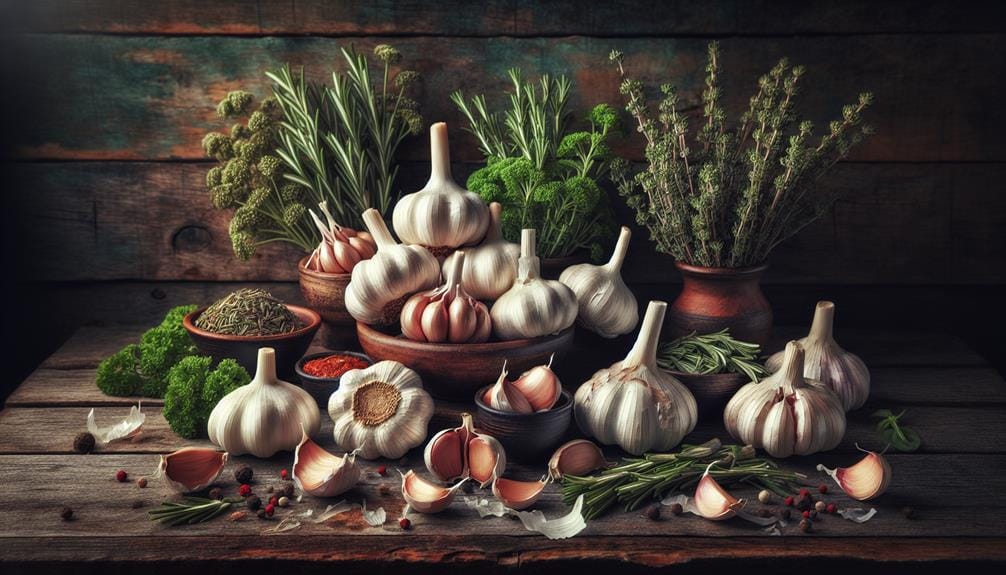
Over the centuries, garlic has been celebrated for its potent immune-boosting properties, thanks to its ability to combat bacteria, viruses, and fungi. It's like your immune system's personal bodyguard, packed with compounds that fend off these microscopic invaders. Whether you toss it into your meals or take it as a supplement, garlic doesn't just make your breath potent—it can also lower cholesterol levels. Real garlic trumps garlic powder, giving you the real deal benefits. Plus, raw garlic is a skin infection superhero.
Here's a quick breakdown:
| Benefit | How It Helps | Notes |
|---|---|---|
| Immune Support | Fights bacteria | Use real garlic |
| Heart Health | Lowers cholesterol | Supplements work too |
| Skin Health | Combats infections | Raw is best |
Sweet Potatoes

Sweet potatoes are a powerhouse for your immune system, thanks to their rich beta-carotene content. This nutrient converts to Vitamin A in your body, which is essential for maintaining strong immune function.
Regularly including sweet potatoes in your diet can help enhance your body's response to infections and illnesses.
Rich in Beta-Carotene
Packed with beta-carotene, sweet potatoes are a nutritional powerhouse that can fortify your immune system. This vibrant tuber is bursting with beta-carotene, which your body converts into vitamin A. Vitamin A is essential for immune function, helping you fend off infections and illnesses. It also plays a vital role in maintaining healthy skin and mucous membranes, which are your first line of defense against pathogens.
By adding sweet potatoes to your diet, you'll enjoy:
- Enhanced immune response
- Protection against cell damage
- Improved ability to fight infections
- Healthy skin maintenance
- Stronger mucous membranes
Supports Immune Function
Adding to the benefits of beta-carotene, sweet potatoes also support immune function by providing essential nutrients that enhance your body's defenses. These vibrant tubers pack a punch against free radicals, those pesky culprits behind the aging process and weakened immune responses.
By munching on sweet potatoes, you're not just satisfying your taste buds; you're also arming your immune system with the tools it needs to combat illnesses and infections. Beta-carotene, which converts to vitamin A, plays an essential role in maintaining a robust immune function.
Miso

Miso, a traditional Japanese seasoning made from fermented soybeans, offers a rich umami flavor along with numerous health benefits. This nutrient-rich paste is a powerhouse for your gut health, thanks to its probiotics that support digestion and a robust immune system. Don't just leave it for your sushi night; miso's got much more to offer.
- Boosts your immune system with probiotics.
- Supports gut health, making your tummy happy.
- Adds essential vitamins and minerals to your diet.
- Versatile in recipes – soups, sauces, dressings, you name it!
- Helps fight infections and strengthens your body's defenses.
Ginger
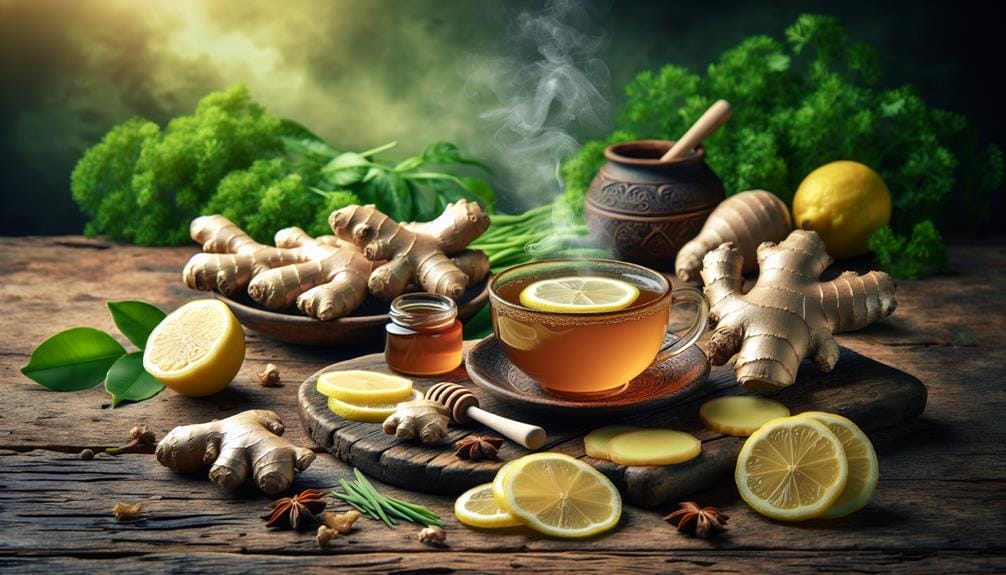
While miso brings gut-friendly probiotics to the table, ginger offers a potent boost with its anti-inflammatory and antioxidant properties. This spicy root is like your immune system's personal superhero, swooping in to save the day.
Thanks to gingerol, a bioactive compound, ginger helps combat inflammation and keeps your body in fighting shape. Feeling queasy? Ginger can kick nausea to the curb and even aid digestion.
The best part is, you don't need to choke down pills—just add ginger to your teas, smoothies, or stir-fries for a flavor punch and health benefits.
Broccoli
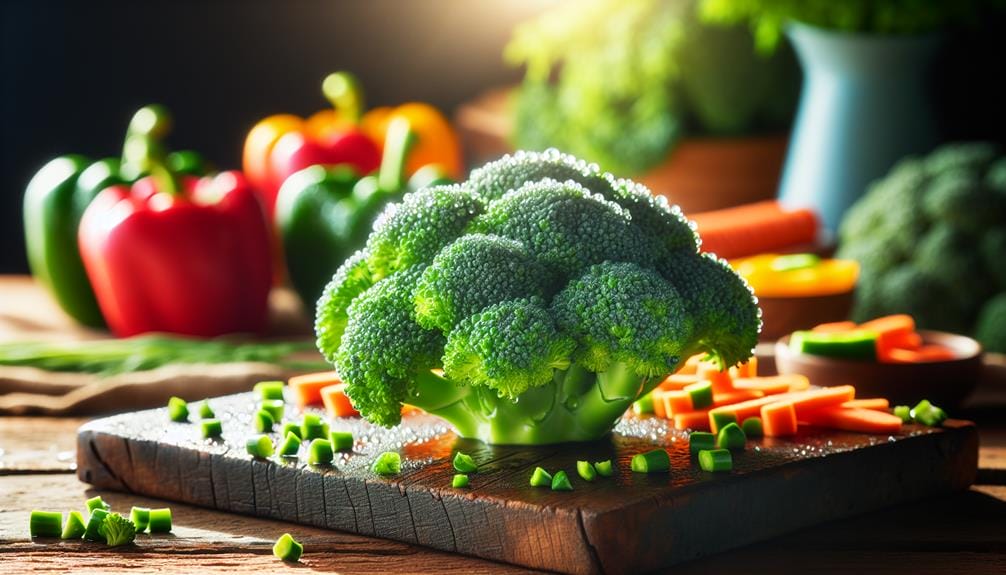
Broccoli, a nutrient-packed powerhouse, is rich in vitamins A and C, essential for keeping your immune system in top shape. This immune-boosting superfood also boasts glutathione, an antioxidant that protects your body from those pesky free radicals.
Plus, broccoli supports cell regeneration and DNA repair, making it a true ally in your quest for health.
Here's why you should love broccoli:
- Vitamins A and C: Boost your immune system.
- Antioxidant-rich: Fights off free radicals.
- Cell regeneration: Keeps your cells fresh and functional.
- DNA repair: Helps maintain genetic health.
- Versatile superfood: Easy to add to any meal.
Conclusion
Think of your immune system as a fortress, and the foods you've read about as its powerful guards. Elderberry, button mushrooms, oysters, watermelon, wheat germ, sweet potatoes, miso, ginger, and broccoli each play a unique role in fortifying your defenses.
By incorporating these nutrient-rich foods into your diet, you're not just eating; you're building a resilient barrier against illness.
Keep your fortress strong, and you'll be better equipped to face whatever comes your way.
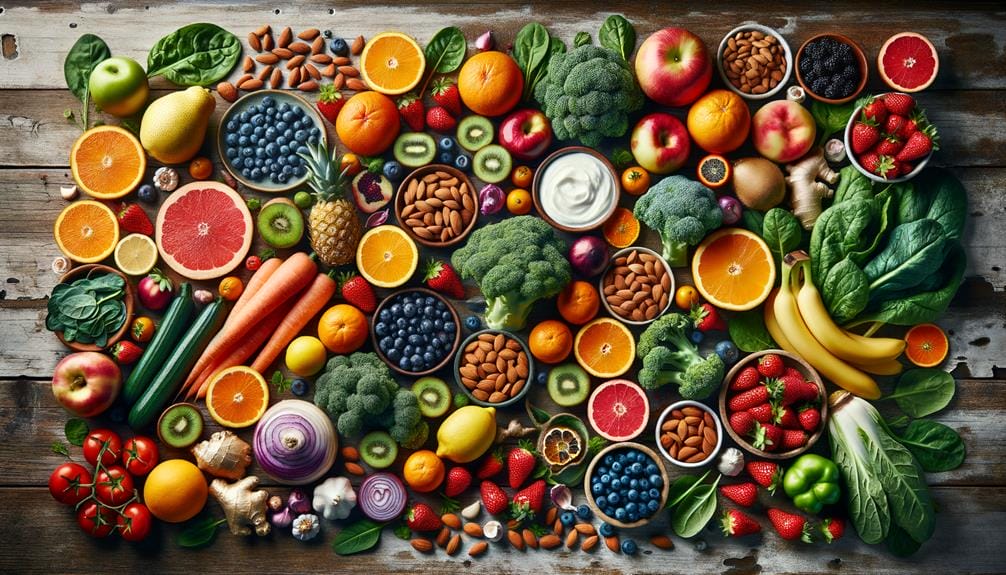








Leave a Comment